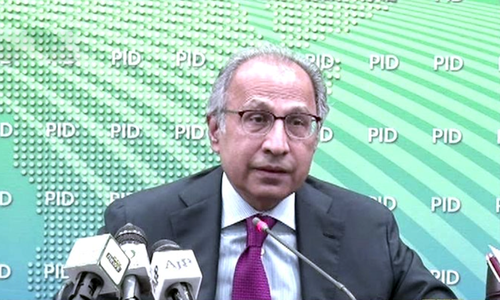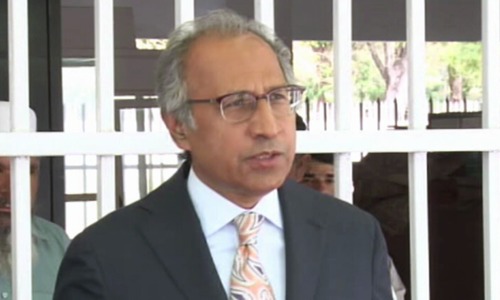Khurram Dastgir Khan of the PML-N is a happy man today. Abdul Hafeez Shaikh of the Finance Ministry is not. And someone, somewhere deep inside the bowels of the PTI may be in the process of ordering a sherwani.
On Wednesday the government reconstituted the National Finance Commission (NFC) under what may presumably be called judicial duress. At stake is more than what meets the eye. Khurram Dastgir was astute enough to recognise the weight of these stakes back when the original notification was issued. It took two months of judicial intervention to row back the issue.
But what is the issue?
The federal government issued a notification constituting the NFC in what was deemed a routine manner. The NFC determines the division of resources between the federal and provincial governments. It is a seminal agreement and forms the bedrock of the provinces’ financial strength. The 18th Amendment and the NFC award have empowered the provinces politically and financially to an unprecedented level. Some people however say this twin-empowerment has come at the expense of the federal government. In recent times, argue these people, the crippling expenses of defence, debt repayments and disaster management have added a tremendous financial load on the federal government. Therefore — the logic goes — it is important to review the existing NFC formula so that the federal government can regain its financial strength.
Fair enough. This is a perfectly reasonable debate to have on the NFC forum. The routine notification was the first step in getting this platform ready. And it would have settled down under the weight of its own consequence had the honourable member from Gujranwala not noticed a stranger on the list.
The NFC is chaired by the federal finance minister and includes the finance ministers of the four provinces. In addition, NFC comprises one member each from the province nominated by the provincial government. Abdul Hafeez Shaikh was notified as the chairman of NFC in his capacity as head of the finance ministry. Except that he’s not a full federal minister. He is an adviser. Khurram Dastgir challenged this in court through his party’s parliamentarian Mohsin Shahnawaz Ranjha. As the proceedings unfolded, the government realised it was in the wrong. So Hafeez Shaikh was removed from the NFC.
The consequence: Prime Minister Imran Khan will now have to chair the NFC personally as he holds the portfolio of the federal finance minister. He will have to negotiate the technicalities of the NFC award with the provinces himself with all the nitty-gritty and numbers with formulas supplemented with equations enumerating deep policy arguments in the context of redrawing the present award.
Or he will have to appoint a full federal finance minister. One swanky sherwani coming up?
The NFC is one of the many battle lines being drawn up between the government and the opposition. These proliferating fronts denote a struggle within the political and governance matrix that may be deeper than it looks.
In today’s context three battles are heating up: NAB, NFC and APC. On all three fronts, it is a one-on-one battle between the government and the opposition. Except it is not.
The long shadows of the establishment loom large across all three theatres of operation silhouetting the conflict in strategic shades.
Context matters.
PML-N’s Khawaja Saad Rafiq had no idea his bail application would reap such rich dividends. It was a routine procedure asking for routine relief from the highest court in the land. The Supreme Court bench proffered him that relief. But it also gave an unexpectedly harsh rebuke to Saad Rafiq’s tormentors. Justice Maqbool Baqar shredded the role of NAB in his judgment by raising some serious questions about the legal and operational weaknesses of the accountability organisation. The judgment may not hold any operative value for NAB but it has injected a dose of adrenalin in the debate about amending the NAB law.
The opposition is delving deep into the finer grain of the law to come up with amendments that all but restructure the role of the organisation. But there could be fierce resistance from the other side(s). Inside the Red Zone there are whispers that this battle royale is about to break out in the open momentarily. Nabbing NAB will not be easy because the unchecked power of NAB to nab is too temptingly convenient for a lot of stakeholders. Make no mistake: this is a tactical battle with strategic stakes.
While the battle over NAB will be fought with legislative swords in the committee rooms of the parliament, the one over NFC will wage with numbers and denominations flung like deadly projectiles by governments fighting over a bigger piece of the financial pie. But don’t be fooled. The NFC skirmish foretells a far more expansive war over the powers of the Centre versus the autonomy of the provinces. Make no mistake: this too may be a tactical skirmish but it comes laden with strategic stakes.
The first two battles may be waged in plush boardrooms but the one being mapped in the APC may spill over into the streets. The All Parties Conference of the opposition parties is planned to happen after Eid and the preliminary agenda is in the process of being worked out. However the key question remains: what is the desired objective and related outcome of the APC? In other words, what does the opposition really want?
The entire framework of the opposition’s politics — assuming there is one — is built around the answer to this fundamental question. And the answer is?
Well, depends who you ask. The PPP may look the most aggressive but with a government to run, it has the most stakes in the present set-up and system. What it wants is therefore quite different from what the PML-N wants since it does not have the weight of a government around its neck. So what then does the PML-N want? Ah, it depends on who you ask within the PML-N, actually. Power. That’s the magic word inside the Red Zone. It’s also the sweetest political symphony ever composed. How to compose it is where the difference today may lie. There is an influential body of opinion within the PML-N which is not interested in the tactical pursuit of Prime Minister Imran Khan’s ouster. This body of opinion is more attuned to the dynamics of the power matrix in the post-Imran era. How will the APC help shape these dynamics? Will generating heat on the streets spur kinetics that can stir the establishment to re-evaluate the existing matrix?
There is plenty that will be factored into the PML-N’s approach towards the post-Eid APC. Make no mistake: the APC may be a tactical move but its objectives will be weighed down by strategic stakes.
Quietude can be deceptive.
Published in Dawn, July 23rd, 2020















































